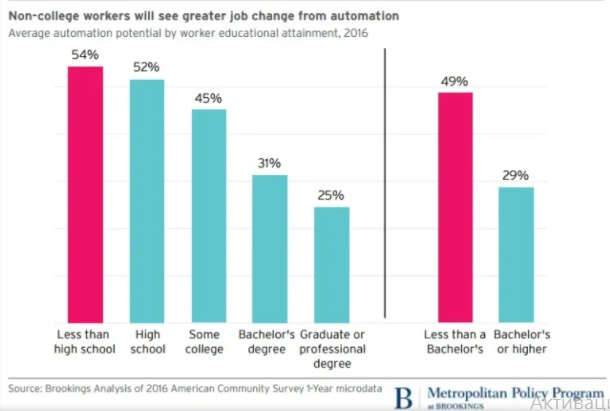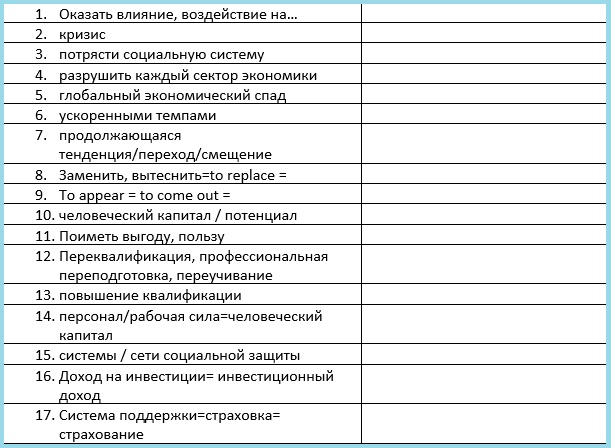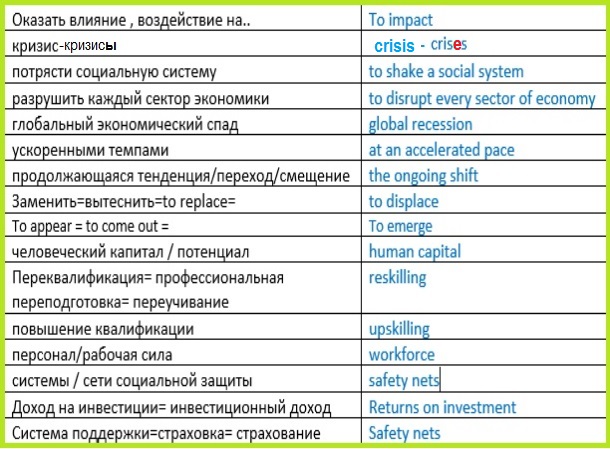I.1. Watch and translate the video below. Turn on the captions.
2. Find in the video English equivalents for the following Russian words and phrases:
Check yourself with the right answers
II. 1. Now do the tests below, watching the video again
2. Prepare answers to the questions below:
1. Are you ready to learn something new all your life?
2. How will it impact many people's lives? Will many of us have no free time at all?
3. What professions are unlikely to be automated?
4. What would you like to do? Where do you see yourself in 10 years' time?
5. Does it make sense to forecast the future of your speciality already now? Why?
6. What is the main idea of the video?
3. Be ready to summarize the video in class in about 10 sentences.
III. Think of answers to the questions below. Before answering them, you may want to watch this short animated film about the fully automated world:
|
Cheerful Dry Assertive Lighthearted Regretful Humorous Pessimistic Nostalgic Melancholic Facetious Joyful Sarcastic Arrogant Persuasive Uneasy Regretful Reverent Inspirational |
Questions for the Speaking Club
|
IV. Read the Forbes article below and
1. [IELTS, EGE, Olympiads] choose the right heading for each part.
|
Robots Will Take Our Jobs And We Need A Plan: 4 Scenarios For The Future by Blake Morgan. Source: forbes.com Here’s the truth: Robots are already starting to take jobs from hourly human workers, and it’s going to continue. Research from McKinsey found that 45% of current jobs can be automated. We need to stop avoiding the situation and create real solutions to help displaced workers. You can’t simply put a stop on technology innovation. Bans often create worse situations than allowing people to innovate but closely watching how we innovate, and the impact to society. Many famous leaders have joined Elon Musk to start something called Open AI, a non-profit artificial intelligence (AI) research company that aims to promote and develop friendly AI in such a way as to benefit humanity as a whole. I have read many books on the subject, and the level of pessimism varies. I found The Sentient Machine by Amir Husain more optimistic about the impact of AI on society, as opposed to the book Rise of The Robots by Martin Ford - more of a cautionary tale that raises concerns about how robots, automation and AI will take all jobs (not just blue collar but also white collar). I found Ford's version of the future to be frankly terrifying. The thing is no one knows for certain what will happen in the future, but there are a number of ways displaced workers could survive. Here are just a few. |
|
|
The majority of jobs that have been displaced or that are at risk for being displaced are process-driven jobs. These are positions that can easily be automated, such as manufacturing, customer service and transportation. Robots and AI can simply do these types of jobs faster and more efficiently than humans. In order to have a productive future, many experts suggest humans and robots need to work alongside each other. Robots need to do jobs that can be automated, and humans need to do the jobs that require a personal or creative touch. Displaced workers could potentially get re-trained to apply their skills elsewhere. A displaced customer service employee knows how to solve problems and be efficient. They could potentially re-skill to build on their existing skills and work in a different area. Even employees who aren’t at risk for being displaced should expand their skills. People move between jobs more often these days, and that provides opportunities to expand their skill sets. The most prepared employees take advantage of online courses, community college classes and industry seminars to expand their skills and even get certifications in new areas. Many companies already provide training and re-skilling for their employees. Perhaps more organizations and governments need to follow in their footsteps. |
; |
|
Bill Gates recently said that AI is a positive for society and that "displaced workers could fill gaps that currently exist elsewhere in the labor market—like elder care, teaching and support for special needs children.” Instead of learning new skills, this solution encourages workers to use their existing skills in a new industry. While it’s true there are often plenty of jobs available in these areas, unfortunately, these important jobs often don’t pay well. In large cities, like where I live in the Bay Area, working in these jobs simply wouldn’t give people enough money to live without a universal basic income. However, these positions are fairly safe from being displaced by robots and can provide job security. |
|
|
The displacement problem is difficult to solve because we can’t see the future. We don’t know what skills will be the most useful in the future or what technology will be the most prevalent. New inventions could be introduced that turn everything on its head and require new skills. If this is the case, displaced workers could potentially have more options of where to go. However, it also makes it difficult to encourage workers in jobs that are at risk of being replaced by robots to expand their skillset if we don’t know what skills will be the most important. Some experts have predicted that soft human skills like communication, creativity and empathy will always be needed because robots can’t replicate those skills. However, new inventions could open the door to other hard skills that could be required and in high demand in the future. |
|
|
Another potential idea is that not everyone will work. It could be that displaced human workers can’t re-skill and don’t have it in them to fill the more human-driven roles. This would obviously lead to higher unemployment numbers, which would have a large impact on society and the economy. The impacts of this possibility are far-reaching. It’s possible we would see more people using welfare and needing affordable housing options. Society would have to find something displaced workers could do to contribute and make a difference, even in a small way. Perhaps it will be more of a sci-fi situation where only people who want to work will work. All other tasks will be done by robots, and those who choose not to work can enjoy other activities. That extreme possibility is definitely a long way off, though it can still be considered. AI and robots are the inevitable future. They will play a role in everyone’s future jobs, whether that means they make it easier or replace it. We need to have conversations now about what to do with displaced workers so we can be prepared when the time comes. |
2. Summarize each scenario described in the article? Which of them seems more likely to you? Use: - According to the first scenario,... - Under/In the second scenario ... - FInally, the best-case scenario presupposes ...
3. [TOEFL, Olympiads] Write a comparison of the text above with the video in task I.
Prompts: -to discuss/highlight the same topic - to focus on ... - to consider ... views on ...future. - less confident - What both the authors agree upon is that.... - are unanimous in their call for...=единодушны в призыве к.. - Unlike ... - Similarly to...,...
4. Questions for the Speaking club:
Are you optimistic or pessimistic about robotization? Will it be easier for everyone to get a job in the future?
What social problems may arise from it?
A very topical question: Should everyone be paid a universal basic income just for being humans? Give arguments. Think whether everyone is eager to indulge in a constructive activity if there is no need to go to work.
V. [EGE 100% / IELTS, other exams, Olympiads ] Imagine that you are doing a project on the threat of automation. You have collected some data on the subject – the results of a historical data analysis (see the bar chart below )

Comment on the data in the table and give your personal opinion on the subject of the project.
Write 200–250 words. If you are writing it in the IELTS format, cover only items 1 and 2
Use the following plan:
1– make an opening statement on the subject of the project work;
2– select and report 2–3 main features;
3– make 1–2 comparisons where relevant and make comments;
4– outline a problem that can arise from automation of jobs and suggest a way of solving it;
5– draw a conclusion giving your personal opinion on robotization.
VI. Think what you will say in the following dialog. If you are doing it as an individual home task, write the dialog and send it in for a check:
A mother and her teenaged child are discussing the youngster's career. The teenagers would like to be a soldier / a therapist / a builder / an artist / a photographer / an economis/ a financial analyst / a programmer / etc. The parent is warning him/her about the threat of automation of the job. The child is sceptical. They discuss possible outcoe and ways to prevent poverty in case of automation.
-You may want to use some of these:
-I think I will ...
-to enroll on a course of =записаться на курсы....
-to enroll at a college = to enter a college
-Have you ever wondered whether .....?
-Why should I? =С чего бы это?
-to stare us in the face = to be looming = to be round the corner= to be approaching =to be imminent =на пороге, грясти
- And what?
-to be always highly required = to be always in high demand =всегда пользоваться большим спросом
- How long is it since + Past Simple? =Сколько времени прошло, с тех пор как...?
- Only 20 years
- And where are all of them now? Gone!
- Yeah, I haven't seen any .... for quite a while.
- Have you heard that ... have launched robotic anesthesiologists / secretaries / customer service managers / advocates / artists / chefs /
dashers [курьеры]/ self-coding software / pilotless cars / pilotless trains and plains / ...? -Ты слышал (а), что... запустили ....?
- No, I haven't. Sounds sinister =Нет.. Звучит зловеще...
- to need to get a master's or, better yet, a postgraduate degree in ...
- (not) to be left =чтобы (не) остаться у разбитого корыта
- What if +Present Simple
- I wouldn't like to V1 . I would rather V1= Я бы не хотел .... Я бы лучше...
-Suit yourself = Whatever=как хочешь.

